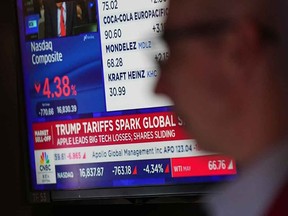Affordable fertilizer will be key to increasing the supply of food if fewer acres are to offset a harvest that excludes Russia and Ukraine
Article content
Nutrien Ltd., the word’s biggest maker of fertilizers, pledged to do its part in fighting global food inflation, stating overnight on March 16 that it will increase potash production by “almost” one million tonnes in the second half of 2022, pushing total production this year to about 15 million tonnes.
Advertisement 2
Article content
The announcement comes amid serious worry that Russia’s invasion of Ukraine will cause a spike in hunger in places such as Egypt and Iran, and economic stagnation in richer countries such as Canada.
“Our thoughts and sympathies are with those impacted by the crisis in Ukraine and we hope for an immediate de-escalation of this conflict,” Ken Seitz, Nutrien’s interim CEO, said in a press release. “The impacts of this conflict extend beyond Eastern Europe as a disruption in supply of key agriculture, fertilizer and energy commodities could have implications for global food security.”
Russia and Ukraine are big exporters of wheat and barley, and the price of both staples has surged some 30 per cent this year as buyers anticipate a supply shortage. The UN’s Food and Agriculture Organization said earlier this month that the global tally of undernourished people was on track to increase by 13 million, as current prices will make food too expensive for the poorest people.
Advertisement 3
Article content
Wealthier countries will be able to feed themselves, but rising food budgets will soak up disposable income that otherwise would be used to power that consumption-led growth on which so many advanced economies have come to rely. David Rosenberg and Brian Livingstone of Rosenberg Research & Associations Inc. observed this week that food and energy inflation has been this severe only four times in the past: 1973, 1979, 2005, and 2008. Three of those years coincided with economic downturns.
“The bottom line is that recession risks are rising, particularly as food and energy prices, which were already spiking, are poised to move higher due to the Russia-Ukraine war,” Rosenberg and Livingstone wrote.
Advertisement 4
Article content
High prices will tempt producers to take advantage, but it’s unclear if farmers elsewhere will reorient their planting schedules in time to make up for the shortfall that will be caused by the war. Nor is it clear that it would even be economic to do so. Input costs such as fuel and fertilizer also are soaring. Russia is a big supplier of crude and natural gas, and it also accounts for about 20 per cent of the world’s potash, an important ingredient in fertilizer.
Affordable fertilizer will be key to increasing the supply of food because high yields will be necessary if fewer acres are to offset a harvest that excludes Russia and Ukraine.
“Nutrien is responding to this period of unprecedented market uncertainty by safely expanding potash production to help provide our customers with the crop inputs they need,” Seitz said. “We continue to closely monitor market conditions and will evolve our long-term plans to ensure we utilize our assets in a safe and sustainable manner that benefits all our stakeholders.”
• Email: kcarmichael@postmedia.com | Twitter: carmichaelkevin
Advertisement
Nutrien to boost potash production by 1 million tonnes amid worries about food security
2022-03-17 14:51:57






